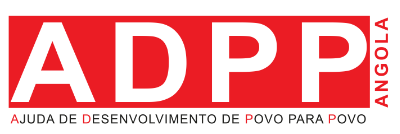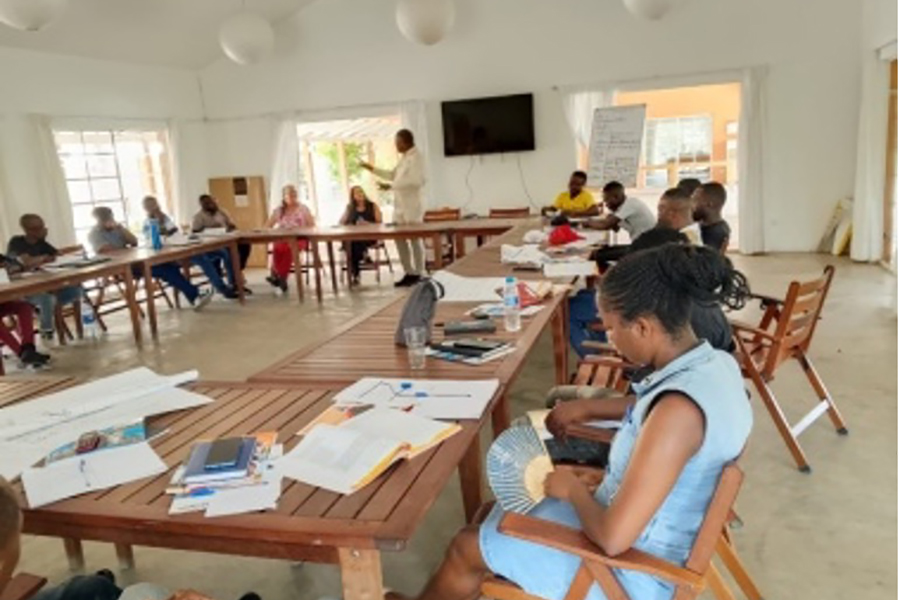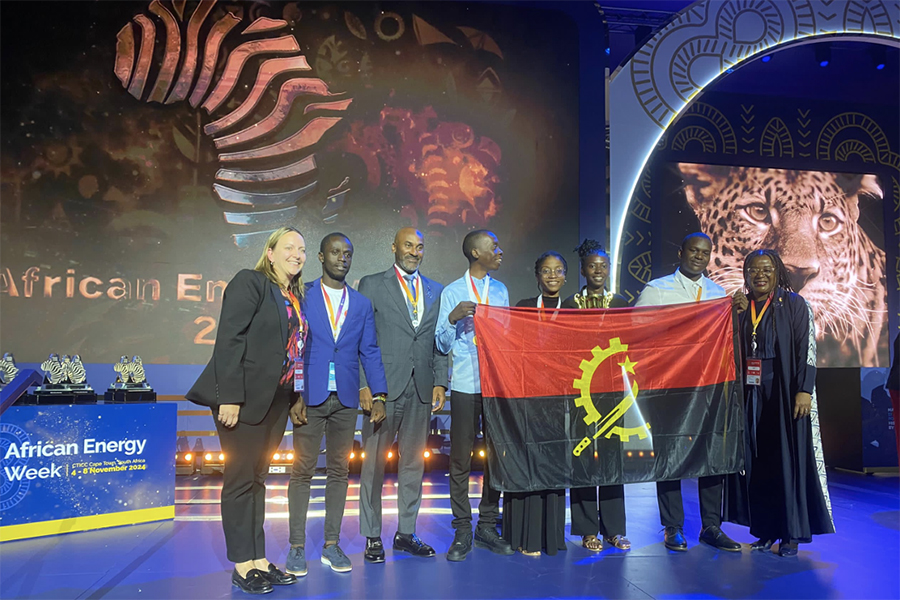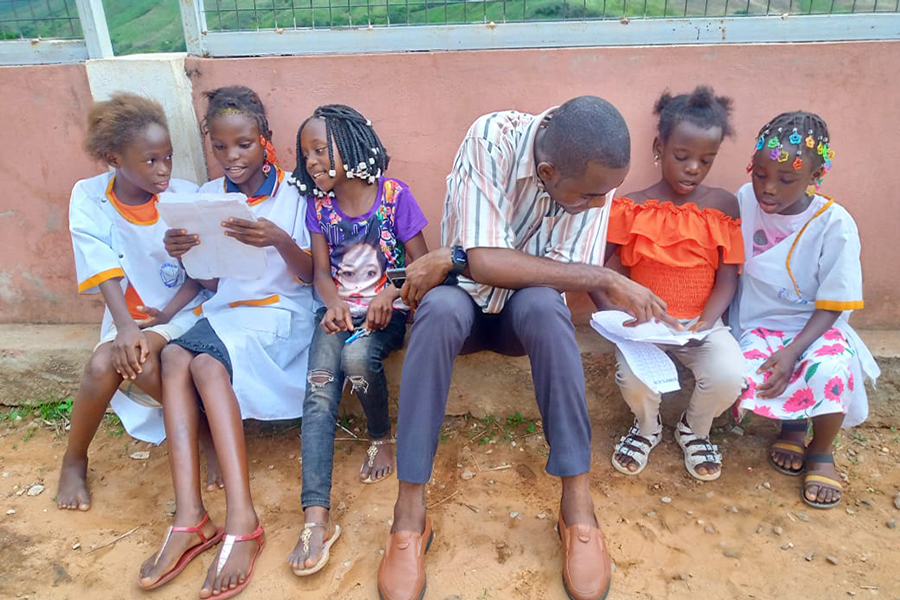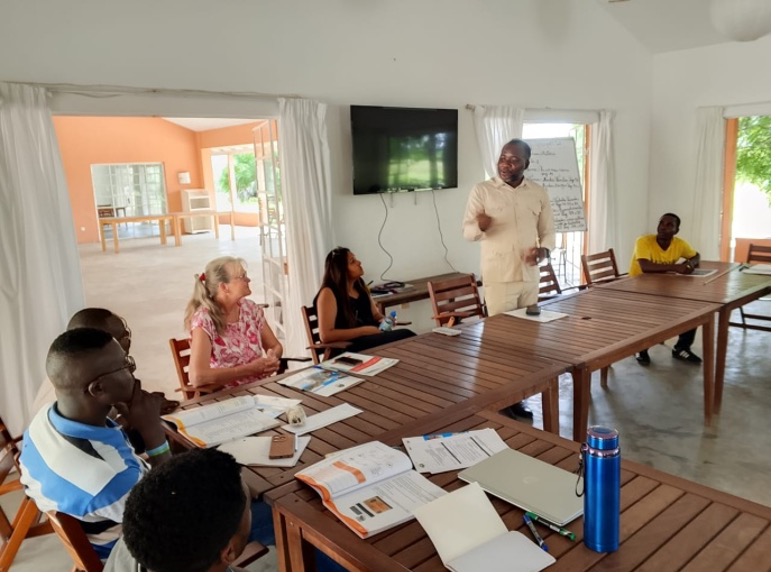
Literacy is one of the fundamental pillars for the development of any country. In Angola, improving literacy rates—especially in rural and hard-to-reach communities—remains a persistent challenge. To address this, ADPP in partnership with the Ministry of Education’s National Directorate for Youth and Adult Education, organized an intensive training course for literacy trainers.
The training took place from 17 to 21 of March at the ADPP Courses and Conferences centre in Luanda. The official opening was led by Dr. Evaristo Pedro, National Director for Youth and Adult Education, who highlighted the importance of strengthening educator training to ensure that all citizens, regardless of age, have access to quality education.
The course aimed train trainers to equip educators working in youth and adult literacy with updated pedagogical approaches, effective strategies, and practical teaching tools to enhance learning outcomes.
ADPP Angola’s Executive Director, Ms. Agneta Dahne, emphasized the importance of the long-standing partnership with the Ministry of Education. She noted: “We have a strong history with the Ministry dating back to 1986, focusing on literacy, accelerated learning, youth and adult education, and since 1995, vocational and teacher training for rural areas.” She also stressed the need for more literacy trainers, saying: “ADPP and the communities need more trainers to continue expanding access to education.” In her remarks, she recalled that ADPP Angola and the MED, through the National Directorate for Youth and Adult Education, signed a Cooperation Agreement on 19 March 2024 to promote functional literacy in Angola. “This training was organized under that agreement, and ADPP is committed to carrying it forward,” she added.
A total of 23 literacy trainers from ADPP community projects participated in both theoretical and practical sessions. These trainers will now go on to train and certify additional educators involved in literacy work.
During the closing ceremony, Feliciano Zeferino Palanga, speaking on behalf of the trainers, stressed the importance of expanding local training efforts to reach more literacy workers. “We came from different parts of the country with the goal of gaining knowledge and leaving here ready to apply everything we’ve learned—methodologies, techniques, and tools that will help spark interest and improve understanding among our future learners,” he said. He also committed to sharing what they had learned with Provincial and Municipal Education Offices where the programme is being implemented.
Closing the event, Ms. Agneta Dahne reaffirmed the role of literacy in both individual and collective development. “We celebrate a victory with each module completed and each activity explored. With the commitment you’ve shown to educating young people and adults, I’m confident that each of you has grown in a unique way. You leave not only with knowledge, but also with new friendships and a support network that can be very valuable going forward,” she said.
Literacy is one of the fundamental pillars for the development of any country. In Angola, improving literacy rates—especially in rural and hard-to-reach communities—remains a persistent challenge. To address this, ADPP in partnership with the Ministry of Education’s National Directorate for Youth and Adult Education, organized an intensive training course for literacy trainers.
The training took place from 17 to 21 of March at the ADPP Courses and Conferences centre in Luanda. The official opening was led by Dr. Evaristo Pedro, National Director for Youth and Adult Education, who highlighted the importance of strengthening educator training to ensure that all citizens, regardless of age, have access to quality education.
The course aimed train trainers to equip educators working in youth and adult literacy with updated pedagogical approaches, effective strategies, and practical teaching tools to enhance learning outcomes.
ADPP Angola’s Executive Director, Ms. Agneta Dahne, emphasized the importance of the long-standing partnership with the Ministry of Education. She noted: “We have a strong history with the Ministry dating back to 1986, focusing on literacy, accelerated learning, youth and adult education, and since 1995, vocational and teacher training for rural areas.” She also stressed the need for more literacy trainers, saying: “ADPP and the communities need more trainers to continue expanding access to education.” In her remarks, she recalled that ADPP Angola and the MED, through the National Directorate for Youth and Adult Education, signed a Cooperation Agreement on 19 March 2024 to promote functional literacy in Angola. “This training was organized under that agreement, and ADPP is committed to carrying it forward,” she added.
A total of 23 literacy trainers from ADPP community projects participated in both theoretical and practical sessions. These trainers will now go on to train and certify additional educators involved in literacy work.
During the closing ceremony, Feliciano Zeferino Palanga, speaking on behalf of the trainers, stressed the importance of expanding local training efforts to reach more literacy workers. “We came from different parts of the country with the goal of gaining knowledge and leaving here ready to apply everything we’ve learned—methodologies, techniques, and tools that will help spark interest and improve understanding among our future learners,” he said. He also committed to sharing what they had learned with Provincial and Municipal Education Offices where the programme is being implemented.
Closing the event, Ms. Agneta Dahne reaffirmed the role of literacy in both individual and collective development. “We celebrate a victory with each module completed and each activity explored. With the commitment you’ve shown to educating young people and adults, I’m confident that each of you has grown in a unique way. You leave not only with knowledge, but also with new friendships and a support network that can be very valuable going forward,” she said.

I recently had the honour of representing Angola as part of ADPP’s delegation at UNESCO in Paris. Our Teacher Training Schools, where I proudly teach, were recognized as one of the Top 10 finalists for the UNESCO-Hamdan Prize for Teacher Development. This global honour celebrates projects with significant impact that align closely with UNESCO’s goals for quality education for all, and being chosen from 102 initiatives worldwide is an immense achievement for Angola!
Being in Paris on World Teachers’ Day, we had the opportunity to showcase Angola’s contributions to global education. Standing at UNESCO alongside the Chairperson of our Board of Directors, I felt the pride of representing everyone involved with ADPP’s Teacher Training Schools—students, graduates, parents, educators, the Ministry of Education, and all our partners. Our schools don’t just teach; we train future teachers to serve rural communities and address real challenges like poverty, sustainability, and health. Our students take charge of their learning and prepare to become leaders in their communities.
UNESCO emphasized the importance of this recognition, stating,
“These ten finalists represent the forefront of global efforts to improve education quality, offering innovative solutions to challenges faced by teachers and students. Their commitment to empowering educators, enhancing learning environments, and fostering community involvement continues to make a lasting impact on teaching practices and student outcomes worldwide.”
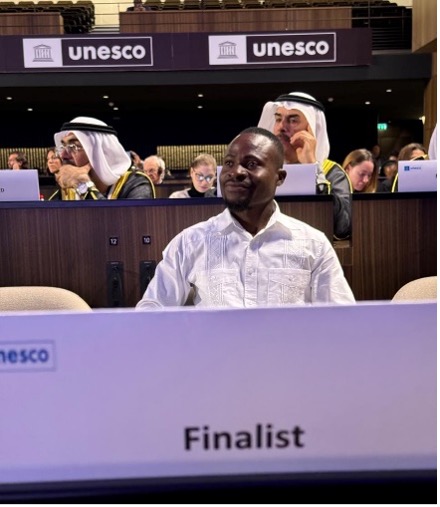
Meeting the other finalists was equally inspiring. We learned about Norway’s approach to active learning, which centres on collaborative methods and practical engagement with sustainability—elements essential for our rural schools. Bangladesh demonstrated the importance of involving the whole community in school management, something we can build on in Angola to strengthen community ties. China shared their approach to teacher leadership, equipping teachers to be mentors and role models, which closely aligns with our goal to develop passionate, community-focused educators. These examples encouraged me to think about ways we can bring similar innovations to our own Teacher Training Schools.
This recognition strengthens ADPP’s mission to empower Angolan teachers for the communities that need them most. It’s a responsibility and a privilege I carry with renewed pride and dedication.
Luís Cahisso, Teacher Training School - ADPP Cuanza Norte

Herculano António, Ernestina Panda, Rildo Francisco, and Ester Gonçalves took first prize in Africa's largest school science competition with their project focused on bringing accessible water and energy to district communities.
The four 10th-grade students from the Telecommunications Institute (ITEL) developed a project featuring a solar-powered system that extracts groundwater using a drill. Some of the water is stored, while the rest powers a machine to generate electricity.
With their project, the ITEL students aim to make water and energy distribution more accessible and practical for urban districts.
STEM Africa is a collaborative initiative between the ExxonMobil Foundation and Junior Achievement (JA) Africa, implemented by ADPP Angola. It aims to prepare young people for the future of work by teaching them to use Science, Technology, Engineering, and Mathematics to address social challenges. It also encourages young Africans to participate in solving real-world issues.
The competition includes participants from several African countries, with a focus on Namibia, Mozambique, Nigeria, and South Africa. The STEM Africa event took place in Cape Town, one of South Africa's largest cities, on November 4th and 5th 2024.
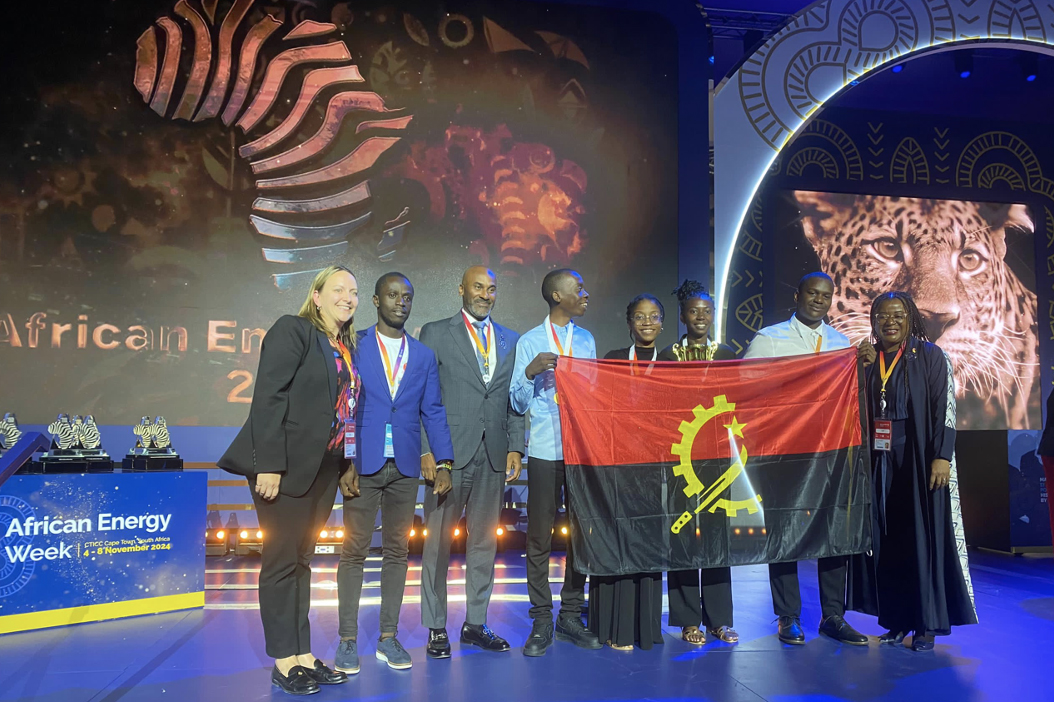
Between October 7th and 11th, 2024, the STEM project held an intensive training session on STEM (Science, Technology, Engineering, and Mathematics) for trainers from the Teacher Training Schools (TTS) in Huambo, Caála and Londuimbali and for teachers local primary and lower secondary schools.
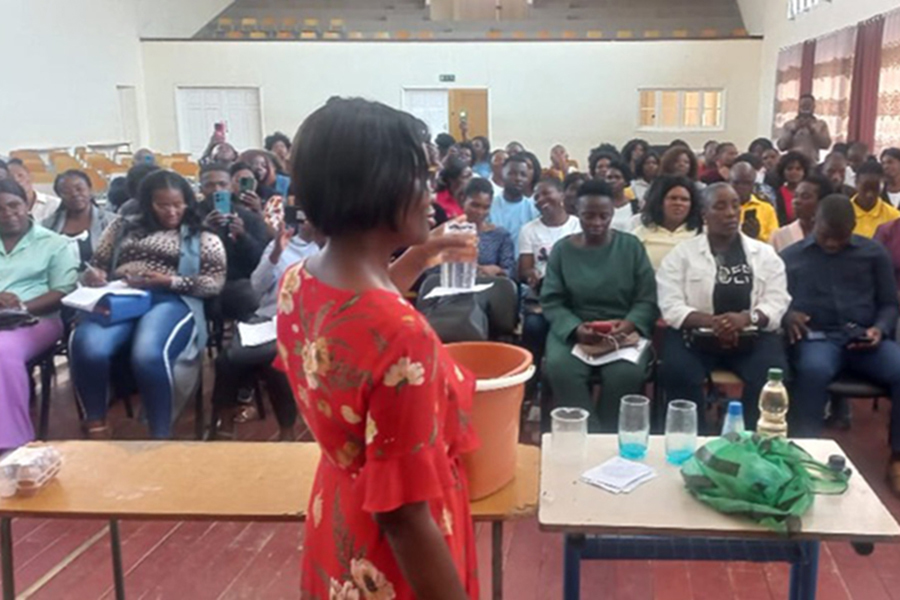
The activity took place at Colégio Comandante Bula in Huambo Province, where participants were encouraged to immerse themselves in STEM education. A total of 150 teachers attended, including 15 trainers from the TTS, and 135 schoolteachers in the municipalities of Huambo, Caála, and Londuimbali.
STEM education integrates Science, Technology, Engineering, and Mathematics, aiming to promote hands-on learning, particularly in Natural Sciences, Biology, Chemistry, Physics, and Mathematics. At the opening session, representatives from the Department of Science, Technology, and Innovation, the Director of Colégio Comandante Bula, as well as the STEM coordinator for ADPP and the provincial STEM focal point were present.
The implementation of this project in Huambo is expected to have a significant impact. By equipping students with STEM skills, it not only enhances their job prospects but also contributes to local economic and social development. STEM education plays a key role in preparing the next generation of innovators and leaders.
The project, to be implemented in Uíge, Bié, Huambo, and Londuimbali, is funded by Block 15, ANPG, ExxonMobil, Azule Energy, Equinor, and Sonangol. In close collaboration with the Ministry of Education, the National Institute for the Training of Educational Personnel (INFQE), and ADPP, it aims to improve the quality of STEM teaching in primary and secondary schools.
The second phase of the STEM project in Huambo is scheduled for April next year, during the pedagogical break. In the meantime, the teachers will be implementing lessons from the STEM manuals in their classes with formative supervision from the project.
On this World Teachers' Day, celebrated on 5 October 2024 under the theme "Valuing Teacher Voices: Towards a new social contract for education," Humana People to People has published an article outlining the critical role teachers play in transforming education systems, the need for increased investment in teacher training, and the importance of supporting teachers to address global shortages, particularly in rural and underserved communities.
As founding members of the Humana People to People Federation, we echo the importance of valuing teachers as key agents in transforming education, especially in rural communities: "Teachers must be valued, as they are key agents of transformation in education – and education systems need to transform to support them. Bringing qualified, supported and motivated teachers into classrooms is the single most important thing to support the learning and well-being of communities."
At ADPP Angola, we are proud to contribute to this effort through our 15 Teacher Training Schools, which prepare primary school teachers to work in Angola’s rural areas, where they are needed the most. These teachers are prepared not just to deliver knowledge, but to help students actively participate in their education, nurturing future generations who will build and sustain strong communities.
We invite you to read the full article https://www.humana.org/more/news/world-teachers-day-2024-we-value-teachers-role-in-transforming-education and learn more about the collective efforts of members of Humana People to People in transforming education.
We particularly enjoyed the newly produced film by our sister organisation ADPP Mozambique, which captures the journey of a teacher during and after her training and the teaching methods she uses in teaching in a rural primary school. Click here to watch it https://www.youtube.com/watch?v=47RxKwsZ0Ak .
Let us continue to invest in teachers—because transforming education starts with them.


